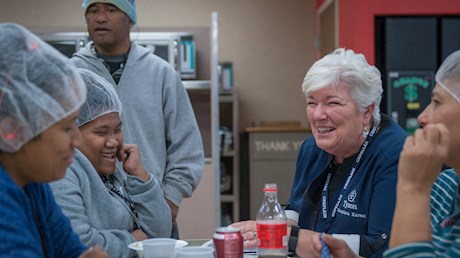Karen Diefendorf starts her days at Tyson Foods by checking in with the human resources and nursing staff at the Springdale, Arkansas, facility. After getting any personnel updates and taking care of emails, she puts on personal protective equipment and hardhat affixed with her title: CHAPLAIN.
Diefendorf, who comes out of the independent Christian Churches and Churches of Christ movement, wore the chaplain badge during her 24-year career in the Army before she began her work at Tyson, where she now does daily rounds to meet with employees. It’s so noisy on the production floor that she relies on a thumbs up, thumbs down system to see who might need counsel, prayer, or guidance.
“If I get a thumb sideways, thumbs down, for sure I’m going to meet them in the break room and see what that’s about,” said Diefendorf, a graduate of Lincoln Christian College and Lincoln Christian Seminary. “If I need more than the 15-minute break or have multiple people I need to see, any chaplain is free to go to that person’s supervisor and work a time to get them off the line.”
Diefendorf leads a team of 100 chaplains—mostly Christian—who provide spiritual support to 122,000 Tyson employees at nearly 400 locations. Tyson’s chaplain program is unique among big companies, and it earned the food processing giant the No. 2 spot on the Religious Freedom and Business Foundation (RFBF)’s religious inclusion rankings, released last month.
HR experts consider chaplaincy a way for companies to see and support their employees as “whole people,” to signal that they don’t have to pretend to leave their hurt at home when they come to work. Done right, these programs—and …
News brought to you by Christianity Today




